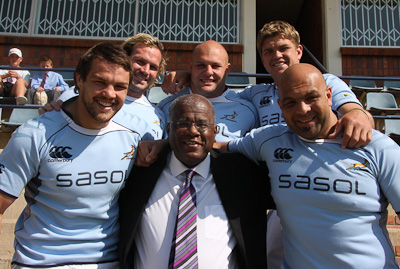Latest News Archive
Please select Category, Year, and then Month to display items
07 January 2018
Photo Charl Devenish
 Dr Anneke van der Spoel van Dijk is invested in contributing
to the global effort of stopping TB by 2035.
Dr Anneke van der Spoel van Dijk is invested in contributing
to the global effort of stopping TB by 2035.
The work of Dr Anneke van der Spoel van Dijk investigates the spread of TB in the Free State population using techniques such as next generation sequencing, spoligotyping and MIRU-VNTR typing. Dr Van der Spoel van Dijk, a senior medical scientist in the Department of Medical Microbiology at the University of the Free State (UFS) also looks at drug resistance in her research. This work informs decisions about how best to treat patients with multidrug-resistant TB (MDR-TB).
She employs rapid molecular techniques to track one of Africa’s most serious diseases, tuberculosis (TB).
Drug resistance
Scientists assist the National Health Laboratory Service and Department of Health in trying to refine the diagnostic tools to identify these cases earlier. Dr Van der Spoel van Dijk explains: “Until recently, it took up to two years to fine-tune treatment decisions for patients with MDR-TB. Patients get a cocktail of anti-TB drugs, but it takes time to find the right combination. Re-infection and relapse (patients stopping treatment for several reasons) add to the diagnostic and treatment management challenges.
Enormous impact
“Now doctors can reduce the time needed for diagnostic certainty to about seven days, while new drugs allow reduction of treatment from more than 18 to nine months. This can have an enormous impact on the life of many patients.”
Dr Van der Spoel van Dijk’s work forms part of research in the faculty looking at resistance development in TB strains. She is currently also doing her doctoral thesis on the differences and incidence of MDR-TB among adolescents versus adults. Dr Van der Spoel van Dijk says: “It is a complicated picture, but we hope to unravel it to support better diagnostic tools and patient care.”
As part of the National Health Laboratory Service, her department is playing an important role in TB diagnostics and the training of scientists and future pathologists. “Our work is contributing to the global vision to stop TB by 2035,” Dr Van der Spoel van Dijk says.
Springboks choose Kovsies' sports facilities
2010-09-02
 |
|
The Springbok team boasts five former Kovsies. From the left, front, are: Flip van der Merwe, Prof. Jonathan Jansen, Rector and Vice-Chancellor of the UFS, and Gurthro Steenkamp. At the back, from the left, are: Jannie du Plessis, C.J. van der Linde and Juan Smith.
Photo: Gerhard Louw
|
Over the years the University of the Free State (UFS) has already produced 67 Springbok and 22 Springbok Sevens players. Therefore it comes as no surprise that the Springboks have chosen the UFS’s sports facilities in preparation for their match against Australia this coming Saturday. They will tackle Australia at the Free State Vodacom Park at 17:00. Five former Kovsies are included in this team. They are Flip van der Merwe, Gurthro Steenkamp, Jannie du Plessis, C.J. van der Linde and Juan Smith.
Kovsies have been providing quality rugby for many decades already. During the 2009 rugby season the UFS rugby club produced 12 players for national teams and 73 players for provincial teams (all age groups). This does not include all the former Kovsies. According to Mr Rockey le Roux from KovsieSport at the UFS, there is currently not one South African Super 14 team that does not include a Kovsie or former Kovsie.
The UFS is also equipped to produce top rugby players. Shimla Park is the main field of Shimla rugby, where all the Shimla games are played. Some of the Varsity Cup games are also played on this field. Boom Prinsloo, the Shimla player named as the 2010 player of the Varsity Cup tournament, is included in the current Springbok Sevens practice team. Shimla Park boasts 1 000-lux lights, which let this field comply with international standards.
There are four more rugby fields that are used for residence rugby. Currently 26 rugby teams of the university's residences and three provincial teams practise on the fields.